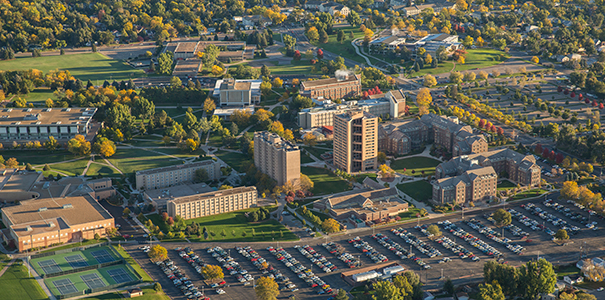
Throughout the month of March, the University of Northern Colorado is hosting a Chicana/o/x and Latinx Film Festival. Each week, a film highlighting a different aspect of Chicana/o/x or Latina/o/x culture, history and contemporary issues will be featured at UNC. The films are free and open to the public. After each film, a live Q&A is held with the director of each film.
This festival is the first of its kind at UNC.
“The main focus of this film festival is on Chicana/o/x and Latina/o/x contributions not only to the state of Colorado, but to the rest of the nation,” said Jonathan Alcantar, associate professor and chair of Chicana/o and Latinx Studies at UNC. “We wanted to curate this film festival by showcasing different genres – some fiction, some documentaries – that will highlight or address a particular issue or topic related to the Latina/o/x, Mexican-American or Chicana/o/x experience in the United States.”
The third film of the festival, “Fruits of Labor,” is scheduled for Wednesday, March 22, at 5 p.m., in the Lindou Auditorium. This coming-of-age story follows a Latina teenager who wants to graduate high school, but who must work long hours in fields and factories to support her family.
The final film in the festival, “Los Betabeleros,” will be shown on March 29, at 5 p.m., in the Lindou Auditorium. This film honors the contributions of Mexican and Hispanic sugar beet workers in northern Colorado. It was produced by Betty Aragon-Mitotes, an activist for the Latino community in Fort Collins and co-founder of Museo de las Tres Colonias.
The first film, “They Called Me King Tiger: A Biography of the Chicano Malcolm X,” was shown on March 1. This documentary explores the life of Reies López Tijerina, a controversial civil rights activist who helped inspire the start of the Chicano Movement in the 1960s and 1970s.
“It deals with the plight of Mexican-Americans to reclaim the Tierra Amarilla Land Grant in northern New Mexico during the 1960s. These lands were illegally taken away by the United States government after the signing of Treaty of Guadalupe Hidalgo,” Alcantar said.
The second film, “Burros,” which was shown on March 8, tells the story of the friendship between a Tohono O'odham girl and a Latina immigrant amidst the hostility surrounding them.
“It deals with the impact of the U.S. -Mexico border on Native American reservations,” Alcantar said. “The whole story is based on the innocence of children, that they don't pay attention to politics.”
The curators of the film festival hoped to include various types of films addressing a wide variety of subject matter in order to recognize the diverse array of people who can all identify as Chicana/o/x, Mexican American or Latina/o/x.
The curators also hope the subject matter of these films resonates for people in northern Colorado specifically.
“We have an emphasis on New Mexico because we do have a lot of community members in Greeley that continue to trace their origins to New Mexico,” Alcantar said. “The migrant population in Weld County is such an important contributor to our economy. Our students are always interested in issues that have to do with the U.S.-Mexico border and migration, so we wanted to be intentional with all the films.
“For ‘Fruits of Labor,’ our department is almost 98% Chicana/Latina, so we wanted to have a story that represented them,” Alcantar continued. “That way, our students can see themselves reflected on some of these struggles. And finally, ‘Los Betabeleros’ highlights specifically northern Colorado and the contributions of early Mexican-American workers to the region.”
The director of “They Called Me King Tiger” hails from Ciudad Juarez, Chihuahua.
“That's important because Greeley has been known as ‘El Chihuahua of de El Norte,’” Alcantar said. “There's a very strong connection between Chihuahua and Greeley and by reemphasizing that, I think that's a powerful way of saying that we care about the community and we're noticing that.”
This film festival exemplifies UNC’s commitment to become a Hispanic-Serving Institution through intentional cultural programming that serves Hispanic/Chicana/o/x and Latina/o/x students.
“Part of this process is making sure that we develop programming that reflects the experiences of the students, but also faculty and staff and community members,” Alcantar said. “Also, we wanted this to be a community festival. It is open to all the members in the community and it’s free. We really welcome a diverse audience to come in and enjoy these films, but also, more importantly, to have a good conversation after they watch them.”
The festival is a collaboration between many departments across UNC and Greeley, including the Department of English, the Greeley-Evans School District 6 Family Center and more.
Alcantar hopes this festival is not only the first of many, but that this event inspires programming and workshops that reach communities across Colorado.
“For the next festival, we're trying to be more mobile,” Alcantar said. “We're trying to take the films to the communities where it's difficult for some families to travel to Greeley or UNC. Our goal is to get the city of Greeley and AIMS Community College involved in the next film festival and to reach out to other school districts who might be interested in either hosting a film or coming to UNC with their classes to take advantage of the films that we're showing.”
Alcantar hopes events like this continue to expand UNC as a school that cares and supports the Chicana/o/x and Latina/o/x community.
He also hopes the presence of the directors of the films for the Q&A sessions will become a stable resource for aspiring filmmakers in the community.
“We don't just want to screen films. We also want the filmmakers to leave something here in Greeley,” Alcantar said. “We have plans of developing workshops where we can have a filmmaker in residence to be here for a few weeks, teach several workshops, and then help students to create their own documentaries or films. We hope that this could be an opportunity to inspire the next filmmaker that comes out of Weld County or Greeley.”
– written by Alani Casiano, a senior English major at UNC
More Stories
-
Governor Polis Reappoints Monfort and Campos-Spitze to UNC’s Board of Trustee
Este artículo no está en español.
-
UNC Choirs Brings Together Guest Musicians, Alumni, Students and Faculty for Major Works
Este artículo no está en español.
-
Week-Long Celebration to Honor First-Generation College Students
Este artículo no está en español.
-
UNC Arts to Host “The President’s Own” United States Marine Band
Este artículo no está en español.




